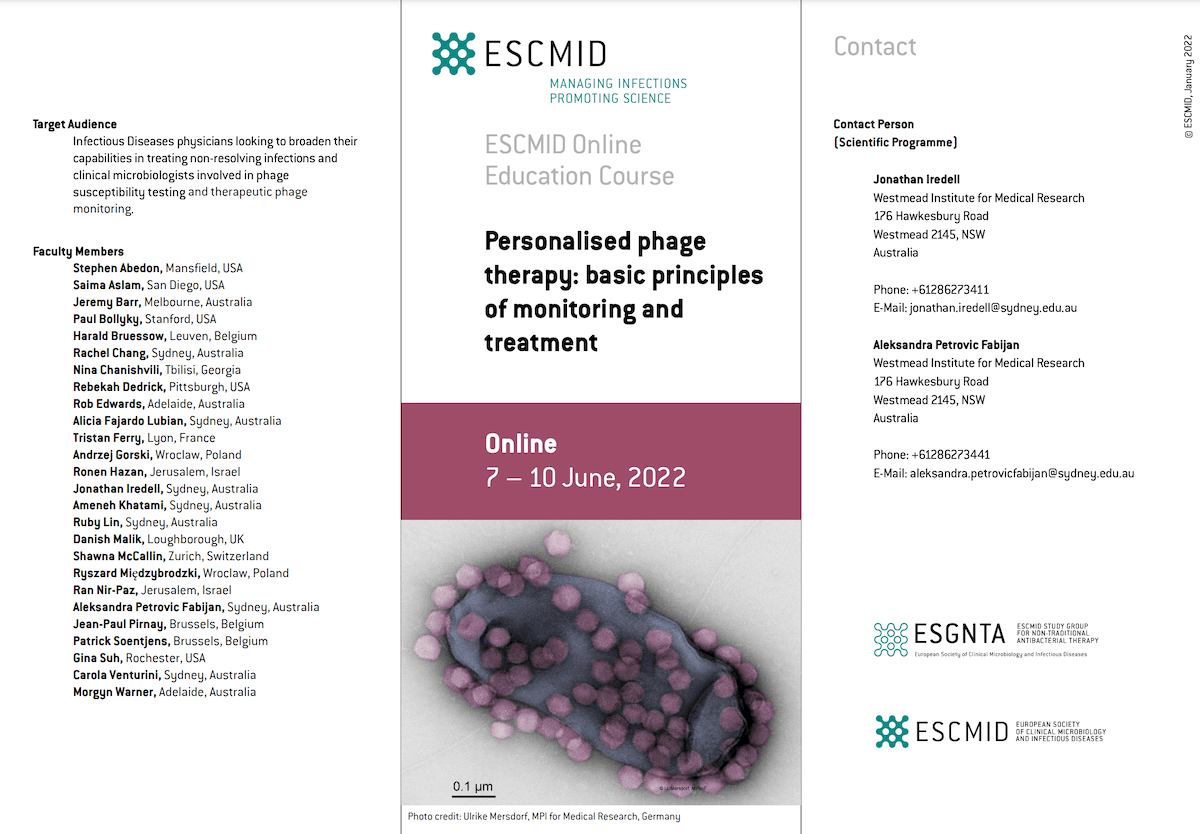Aleksandra Petrovic Fabijan
Alex completed her PhD in phage biology at The University of Novi Sad (Serbia) in 2016 as part of the Hungary-Serbia IPA Cross-Border Cooperation Programme (European Commission HUSRB 1203/214/250). She then moved to Australia to continue her postdoctoral career under the supervision of Prof. Jonathan Iredell. Since 2018, Alex has been working as a lead phage scientist in the world’s first-in-human clinical trial of intravenous GMP-grade phage therapy (Petrovic-Fabijan et al, 2020 Nature Microbiology), where she studied bacteria-phage interaction and host response in critically ill patients receiving phage therapy. Alex has been recently awarded a 3-year (2022-24) fellowship from Office for Health and Medical Research NSW ($390k) that will support her research on bacterial cell and phage biology, with a special focus on interactions between clinically important bacteria such as L-forms and therapeutic phages. Alex is leading a lab side of Mycobacterium phage therapy at Westmead (Iredell Lab), developing diagnostic methods for therapeutic monitoring of phages and pioneering more accurate and reliable approaches for testing antimicrobial agents in vitro. Her research profile and publications are available at ResearchGate and Google Scholar. Qualifications: Overseas trained Division 1 Nurse, BSc (Honours), MSc and PhD in Phage Biology. Alex is an Executive Board Officer of the International Society of Viruses of Microbes (ISVM) and a member of the organising committee for the ISVM’s conference Viruses of Microbes 2024, Cairns. She is also part of the ESCMID Study Group for Non-traditional Antibacterial Therapy (ESGNTA), where she coordinated the ESCMID/ESGNTA education course on personalised phage therapy in 2022. Her Twitter handle is @PetrovicFabijan, and she officially handles the @VirusOfMicrobes Twitter account.
Bacteriophages (phages) are viruses with the ability to infect bacteria, and they have recently attracted substantial attention as potential therapeutic alternatives or adjuvants to antibiotic therapy due to the global urgency of antimicrobial resistance. Antibiotics have been the clinical ‘gold standard’ for treating bacterial infections, and their pharmacokinetics/pharmacodynamics (PK/PD) have been extensively investigated over the past decades. Unfortunately, there has been a significant lack of research on the PK/PD of phage therapy, severely hindering its clinical translation. Recognising this as a major hurdle, excellent reviews summarising the available literature on phage PK/PD have been published over recent years. The aim of this present narrative review is to discuss the PK/PD challenges with the clinical translation of phage therapy and address the voids that need to be filled.
Staphylococcus aureus is a leading cause of bacteraemia and endocarditis in which intraclonal genetic variation, but not true polyclonal bacteraemia, is well documented. We describe a case of 36-year-old women with simultaneous and persistent bacteremia from two strains of Staphylococcus aureus that probably would have gone unrecognised because of the identical antibiotic profiles if had we not used bacteriophage susceptibility (“phage typing”) to further characterise the strains. In this patient, the dual bacteraemia was followed months later by another bacteraemia that likely would have been deemed a relapse of the original infection, except that we used similar methods to identify a third and unrelated strain. Our patient eventually responded well to antibiotics, and her bacteriophage therapy probably contributed little to that recovery. However, bacteriophage therapy required that we identify the strain of S. aureus causing her bacteraemia, and that requirement led directly to our identification of dual strains with identical antibiotic susceptibilities. Because of this experience, we alert other clinicians to the possibility of polyclonal infections with S. aureus. When bacteraemia is suspected, clinicians often pick a single colony or a few colonies from the original culture because prompt identification of the organism is critical and this practice provides a faster turnaround time. We caution that it might not identify different strains with different antibiotic sensitivities when polyclonal infections are present.
Bacterial L-forms require specialized culture techniques and are neither widely reported nor well understood in human infections. To date, most of the studies have been conducted on Gram-positive and stable L-form bacteria, which usually require mutagenesis or long-term passages for their generation. Here, using an adapted osmoprotective growth media, we provide evidence that pathogenic E. coli can efficiently switch to L-forms and back to a cell-walled state, proliferating aerobically in supratherapeutic concentrations of antibiotics targeting cell walls with few or no changes in their DNA sequences. Our work demonstrates that L-form switching is an effective adaptive strategy in stressful environments and can be expected to limit the efficacy of β-lactam and phages for many important infections.
Bacteriophages (phages) are selective viral predators of bacteria. Abundant and ubiquitous in nature, phages can be used to treat bacterial infections (phage therapy), including refractory infections and those resistant to antibiotics. However, despite an abundance of anecdotal evidence of efficacy, significant hurdles remain before routine implementation of phage therapy into medical practice, including a dearth of robust clinical trial data. Phage–bacterium interactions are complex and diverse, characterized by co-evolution trajectories that are significantly influenced by the environments in which they occur (mammalian body sites, water, soil, etc.). An understanding of the molecular mechanisms underpinning these dynamics is essential for successful clinical translation. This review aims to cover key aspects of bacterium–phage interactions that affect bacterial killing by describing the most relevant published literature and detailing the current knowledge gaps most likely to influence therapeutic success.
The first phage therapy course jointly organised by ESCMID (European Society of Clinical Microbiology and Infectious Diseases) and ESGNTA (ESCMID Study Group for Non-traditional Antibacterial Therapy) and includes four sessions with cutting-edge scientific talks in the field of personalised phage therapy : (1) therapeutic monitoring (2) immune response to bacteriophages (3) formulation and administration of bacteriophages for therapy, and (4) current state and prospects of oral phage therapy, followed by live Q&A sessions and panel discussion.

